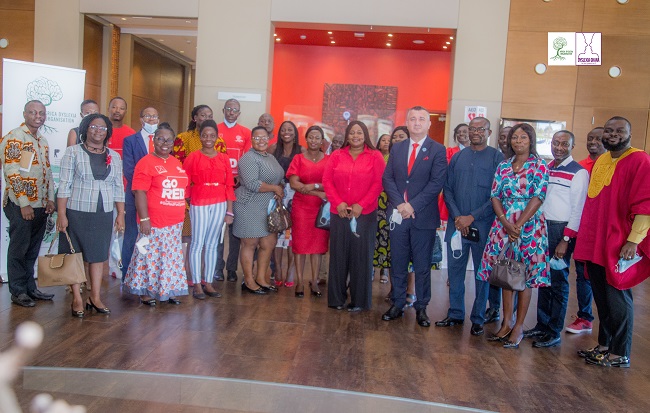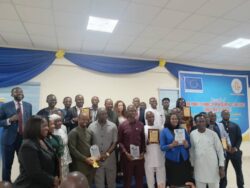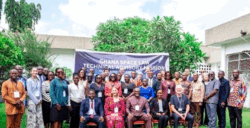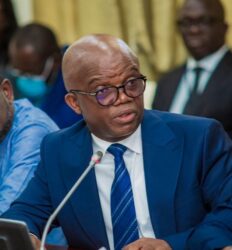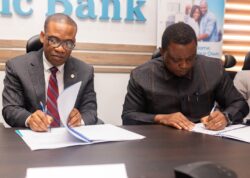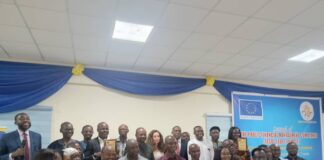Dyslexia can be classified as a neuro-cognitive disorder mostly associated with people who have difficulty in reading and forming words. Usually present in both children and adults, dyslexic people are often confused to be lazy or dumb. On the contrary, they are actually smart, intelligent and creative when the disability is identified early and given the needed interventions.
The UN Sustainable Development Goal 4 is an educational goal, which aims to “ensure inclusive and equitable quality education and promote lifelong learning opportunities for all.”
In line with these, the Movenpick Ambassador Hotel in Accra was the venue for the launch of this years Dyslexia Awareness Week under the theme: “Go Red for Dyslexia.”
Hosted by Dyslexia Ghana (Crossroads@U2Kan) and the Africa Dyslexia Organisation, over thirty participants made up of different stakeholders were present to share their experiences and also discuss how to intensify the campaign for dyslexia awareness in Africa.
Speakers at the event were Founder of Africa Dyslexia Organisation Rosalin Kyere-Nartey, Founder of Dyslexia Ghana Joy Thomas, Akua Sarpong and Mr. Fredrick Kisseh who both have experience as parents with dyslexic children.
As part of the programme line up for the month, the campaign would be ‘go red’ for 7 days from October 5th to 11th. This was made known by Rosalin Kyere-Nartey, who is also spearheading the campaign. Rosalin, who discovered she is dyslexic three years ago, adds “hidden disabilities can be dangerous as they do not show immediate physical signs. Every child is a star, every child has a gift. The only way that a child loses that star is when the opportunity is not given to them at the right stage of their life.”
As part of its Corporate Social Responsibility, the Movenpick Ambassador Hotel in Accra provided the venue for the event. In a welcome address its General Manager, Mr. Adnan Yucel expressed excitement about being associated with the initiative.
A research by The Yale Center for Dyslexia Creativity in the United States shows that dyslexia affects 20 percent of the population and represents 80-90 percent of all those with learning disabilities. Joy Thomas, Founder of Dyslexia Ghana who joined the event via video conferencing shared interesting statistics as well as an overview of historical dyslexia awareness timelines. The disability can be a developmental genetic condition which is quite common in every population, as well as acquired through instances such as head injuries and strokes.
Dyslexia Awareness Week is observed during the first week of October each year, with Thursday October 8th singled out as World Dyslexia Awareness Day in 2020. Red is the colour for ‘action’, which is associated with all dyslexia awareness campaigns globally.
A parent, Mr. Frederick Kisseh shared an emotional story at the event on raising his dyslexic son who is now schooling in Australia.
Akua Sarpong who also has a dyslexic son shared her story and also provided pointers that worked for her in handling the disability successfully. In her case, she made learning fun and added extra activities such as swimming lessons which made her son very confident as he won many medals there. Parents must be the biggest cheerleaders of their children, as affirmation is important when handling dyslexic children. She also added that parents must make friends with their children’s’ teacher by motivating and encouraging them; and in addition, they must be honest with themselves about the situation in order to calm their nerves when times get frustrating. That’s a sure way to find a solution.
Stakeholders at the event also included representatives from the Ministry of Education and Ghana Education Service who assured that their Inclusive Education unit has special interest in dyslexia awareness and working towards the campaign as well.
Rudolf Berlin, a German ophthalmologist introduced the term ‘dyslexia’ in 1887 to describe difficulty with words his patients had. Since that time, several milestones have been chalked in learning more about dyslexia, its diagnosis and how to successfully correct the disability.
Dyslexia is often confused with autism. Although both have an overlapping similarity in terms of learning difficulties, autism presents more complicated development issues such as communication problems compared to dyslexia, which is mostly associated with difficulties in learning to read and write words. Diagnoses for both conditions are different, however when handled properly it brings out the best in the affected children.
Anyone can be part of the Dyslexia Awareness Campaign by spreading the word, volunteering, and inviting the team to educate people at institutions such as schools and churches. Through efforts from all stakeholders, children and adults diagnosed with dyslexia will be able to meet their full potential and fulfill their dreams and ambitions.
October is for Dyslexia Awareness. Do not be left out in the campaign.
Line up of Activities for Dyslexia Awareness Month
5th October 2020: Launch of Dyslexia Awareness Week, Moevenpick Hotel Accra.
6th October 2020: Public and Media Awareness Outreach
7th October 2020: Public and Media Awareness Outreach
8th October 2020: Overview on Dyslexia Global Conversations with Ms. Joy Thomas
9th October 2020: Public and Media Awareness Outreach
Dyslexia Global Conversations with Dr. Samantha-Kaye Johnston
10th October 2020: Public and Media Awareness Outreach
11th October 2020: Public and Media Awareness Outreach
13th October 2020: Dyslexia Global Conversations with Dr. Gad Elbeheri
30th October 2020: Virtual Dyslexia Training Workshop
31st October 2020: Virtual Dyslexia Training Workshop
To register for the Virtual Dyslexia Training Workshop, or for further enquiries, please send a WhatsApp message to 0243 535553.
About Africa Dyslexia Organisation and Dyslexia Ghana
The Africa Dyslexia Organisation is a nonprofit organisation that provides help for Dyslexic people. We exist to empower families and individuals with current and factual information about Dyslexia, resources to manage the condition, and support to curb the stigma attached to the condition. We align with the UN Sustainable Development Goal 4 on education to achieve diversity and inclusion for all children.
For more information or enquiries about the Organisation, kindly contact +2332 43 535553 or email [email protected].
Dyslexia Ghana (Crossroads@U2Kan) is a Non-Governmental Orgnaisation set up by a person with dyslexia for people with dyslexia, with the motive that every person deserves education and a right for their needs to be identified and fully met.
For more information or enquiries about Dyslexia Ghana, kindly contact [email protected] or call +233 20 0646863 or visit www.dyslexiaghana.com

